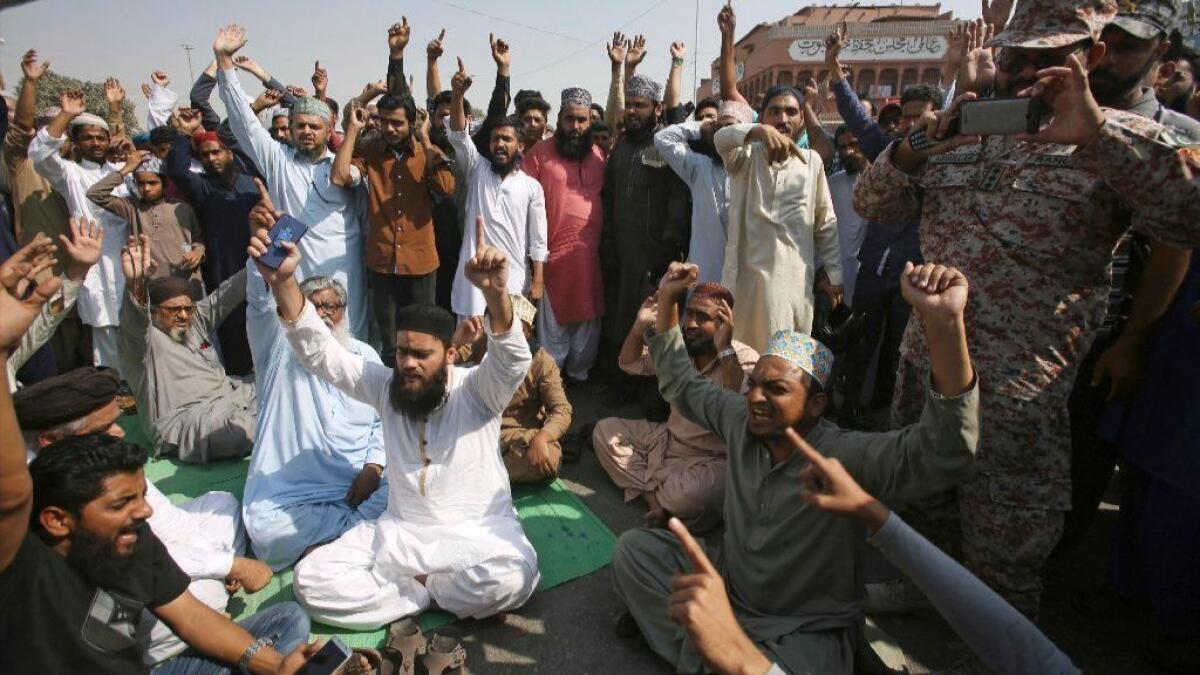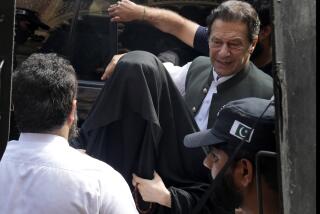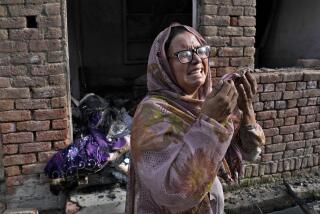Pakistan court frees Christian woman in blasphemy case as Islamists protest

- Share via
Reporting from Islamabad, Pakistan — The Supreme Court of Pakistan on Wednesday acquitted a Christian woman who had been sentenced to death in 2010 for insulting the Prophet Muhammad, a ruling that was rejected by Islamists who raised the threat of violence.
The court’s chief justice, Mian Saqib Nisar, announced the ruling in a crowded courtroom and demanded authorities free the woman, Asia Bibi.
Bibi was being kept in a high-security prison cell in the southern city of Multan and was likely to leave the country given the threats against her. Her family says she never insulted the prophet.
Islamist protesters gathered in the streets of Islamabad and other major cities to denounce the verdict, egged on by extremist leaders who use perceived insults to Pakistan’s official religion as a rallying cry.
In the garrison city of Rawalpindi, Islamist demonstrators reportedly attacked police and a journalist.
The case dates to 2009, when two Muslim women objected to Bibi, a farm worker, drinking water from the same well as them. A mob later accused her of blasphemy, leading to her arrest and trial, where she was convicted and sentenced to death.
Blasphemy is a capital offense in Pakistan, where in the past mobs have targeted Pakistanis accused of the crime or lawyers who defended them. In 1997, a judge who acquitted a blasphemy defendant was killed.
A three-judge panel of the Supreme Court upheld the blasphemy law itself but ruled that the prosecution “categorically failed to prove its case” that Bibi had insulted the prophet.
An Islamist party, Tehreek-e-Labbaik, or TLP, has gained political mileage from the Bibi case, with its leader releasing a video message before the verdict saying that its followers were “ready for all kinds of sacrifices” if Bibi were set free.
“We are ready to give our lives for the respect of our holy prophet,” said Malik Abid, a TLP leader from Rawalpindi. “We will not allow them to release condemned blasphemer Asia Bibi even if I … get my head butchered.”
Ghulam Mutafa, a lawyer representing Bibi’s accusers, termed the decision unacceptable and said he would file an appeal.
Malik Adil, a 30-year-old TLP member in Rawalpindi, used an obscenity to refer to Bibi and called for her to be hanged.
“They can kill us but they cannot force us to accept the decision,” he said.
Christians make up less than 2% of Pakistan’s 182 million people but have often been the target of violence. In 2016, the Pakistani Taliban extremist group claimed responsibility for an Easter bombing of a park in Lahore that killed more than 70 people. The group said Christians were the target, although most of the victims were of other faiths.
Peter Jacob, executive director of the Center for Social Justice, a Lahore-based activist group that works with marginalized and minority communities in Pakistan, said authorities needed to secure Christian neighborhoods and churches given increasing threats to the community.
“I do not think [Bibi] can live in Pakistan even if declared innocent by the top court of the country,” Jacob said. “Her family is also living under constant threat.”
Amir Rana, an Islamabad-based expert on religious extremism, said Pakistani authorities needed to deal firmly with groups that threatened or carried out violence in the anti-Christian demonstrations. In the past, Pakistan’s security establishment has frequently tolerated or supported Islamist groups in order to undermine secular opponents.
TLP “has the capacity to create havoc all over the country,” Rana said. “The appeasement policy will strengthen such forces. It’s time to come up with once-and-for-all policy: Do not let anybody take the law into his or her hand.”
Sahi is a special correspondent. Times staff writer Shashank Bengali contributed to this report from Colombo, Sri Lanka.
More to Read
Sign up for Essential California
The most important California stories and recommendations in your inbox every morning.
You may occasionally receive promotional content from the Los Angeles Times.










